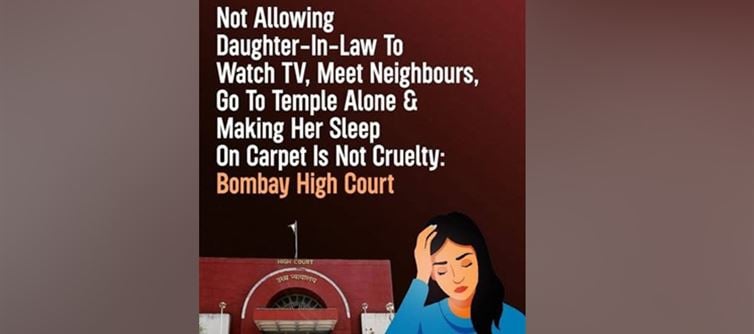
💣 INDIA’S NEW love LANGUAGE — DENIAL AND DEHUMANIZATION
If your in-laws forbid you from watching TV, isolate you from the world, and make you sleep on the floor — don’t worry, ladies, the bombay high court says that’s just… affection.
In a ruling that could only happen in a country where patriarchy wears a judge’s robe, the aurangabad bench of the bombay high court quashed a 20-year-old conviction under Section 498A, ruling that denying a woman basic dignity does not amount to cruelty.
Apparently, sleeping on carpets is a culture, and emotional isolation is just “in-law intimacy.”
Welcome to India’s latest courtroom circus — where empathy dies, and gaslighting gets a legal stamp of approval.
🧾 THE CASE THAT REDEFINED CRUELTY
The original case was simple — a daughter-in-law alleged that she was denied food, basic freedom, and was forced to live like an unwanted guest in her own marital home.
She wasn’t allowed to watch TV.
She couldn’t visit temples or talk to neighbors.
And her bed? A carpet on the cold floor.
The lower court called it mental cruelty — the high court called it “domestic adjustment.”
Translation: suffer silently, or risk sounding “too sensitive.”
Because, in 2025, india, even the law believes women are being dramatic.
🛏️ “CARPET BED” IS THE NEW MARITAL BLISS
In the eyes of the judiciary, deprivation has apparently become a form of devotion.
The court said these actions did not meet the “severity” required to qualify as cruelty under Section 498A of the indian Penal Code.
So, by that logic —
Sleep deprivation = family bonding.
Isolation = discipline.
Emotional starvation = indian tradition.
If that’s not judicial satire, what is?
Next, we might see a headline that reads:
“Court Declares Starving Daughter-in-Law ‘Healthy Example of Fasting Culture’.”
📺 NO TV, NO TEMPLE, NO FREEDOM — JUST “TOUGH LOVE”
Let’s be clear: denying a woman communication, companionship, and comfort isn’t “quirky household behavior.”
It’s systemic psychological control.
It’s the silent, invisible violence that pushes thousands of women into depression and suicide every year.
But the court didn’t see cruelty — it saw inconvenience.
It didn’t see isolation — it saw “discipline.”
It didn’t see patriarchal abuse — it saw “lack of evidence of severity.”
This isn’t law.
This is institutionalized blindness dressed up as jurisprudence.
🧨 social media ERUPTS — “NEXT, THEY’LL LEGALIZE SUFFERING”
The verdict sent shockwaves through social media.
One user quipped,
“So, my in-laws can now cancel Netflix and call it love?”
Another wrote,
“At this rate, burning her alive will be called ‘warmth of affection.’”
Hashtags like #CarpetJustice and #498AWipeout trended as thousands of women called out the judgment for normalizing everyday domestic abuse.
Because this isn’t a one-off verdict — it’s part of a dangerous pattern of softening cruelty into “cultural expectation.”
⚖️ THE REAL CRUELTY IS LEGAL COMPLACENCY
Section 498A was created to protect women from domestic violence — from physical abuse to emotional torture.
But the way indian courts interpret it today, it’s become a relic of performative feminism.
When a woman is humiliated, controlled, or mentally crushed, the system doesn’t protect her — it cross-examines her pain for exaggeration.
This verdict doesn’t just insult one woman — it sets a precedent that suffering is subjective, and that dignity depends on how thick your carpet is.
🩸 PATRIARCHY WEARING A JUDGE’S WIG
It’s always the same story:
When a woman complains, she’s “overreacting.”
When she leaves, she’s “breaking the family.”
When she dies, the court says “she couldn’t adjust.”
The men who make these rulings don’t sleep on carpets.
They sleep on privilege.
And that’s why they don’t recognize deprivation as cruelty — because they’ve never lived it.
🧠 A LAW BOOK THAT NEEDS A CONSCIENCE
indian law doesn’t need more amendments — it needs empathy.
Because no amount of legalese can hide the rot of moral apathy in our justice system.
If a court can’t recognize psychological cruelty, then it’s not just failing women — it’s failing the very definition of justice.
A daughter-in-law is not property.
She’s not a “domestic trainee.”
And being denied dignity is not “a lack of adjustment.”
It’s abuse — plain, simple, and unforgivable.
⚡ FINAL WORD: THE CARPET IS CLEAN — BUT THE SYSTEM IS FILTHY
This verdict doesn’t just absolve in-laws — it absolves cruelty itself.
It tells every young woman entering a marriage:
“Learn to suffer quietly, or you’ll be told you weren’t strong enough to adjust.”
If sleeping on carpets is “domestic adjustment,” then justice in india is a doormat soaked in patriarchy.
Because, as long as our courts keep confusing cruelty with culture, every woman walking into a new home should carry two things — a wedding sari, and a survival manual.




 click and follow Indiaherald WhatsApp channel
click and follow Indiaherald WhatsApp channel